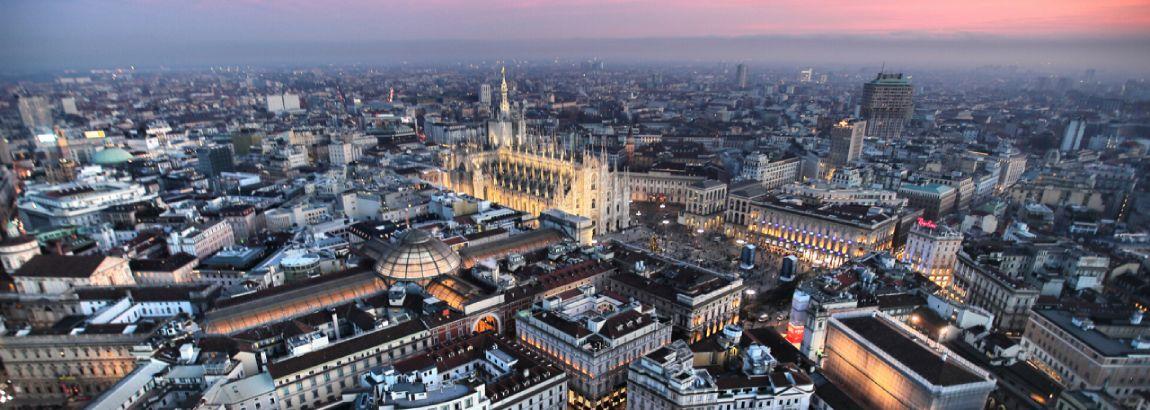
| City - Airport | Arrival: | ||
| Iasi | Chisinau | ||
| from Bucharest (BUH) | BUH → IAS | BUH → RMO | |
| - Henri Coanda (OTP) | OTP → IAS | OTP → RMO | |
The administrative center of the region of Lombardy, the largest region of Italy, and the territorial unit of the same name, equated to a province.
Refers to global cities.
The second largest city in Italy and the center of the country's largest urban agglomeration. Has a reputation as the financial and economic capital of the country and one of the world's fashion capitals.
or Cathedral of the Nativity of the Virgin Mary - a cathedral located in the historic center of Milan. Dedicated to the Nativity of the Blessed Virgin Mary. Constructed of white marble in the Flaming Gothic style. Construction began in 1386, but it was completed only at the beginning of the 19th century, when, by order of Napoleon, the facade was completed. Some details were also completed later, until 1965. It is a late Gothic building that contains many spiers and sculptures, marble gabled turrets and columns connected by a large number of soaring pillars. One of the largest in Europe.
covered shopping gallery in the center of Milan, one of the first passages in Europe, built in 1865-1877. An architectural monument, an attraction near the Duomo square, is open to the public around the clock. The gallery building is in the shape of a Latin cross with an octagonal center decorated with mosaics depicting the four continents, as well as allegorical representations of art, agriculture, science and industry.
the name of the residences of the Milanese dukes of the Sforza dynasty in Milan and Vigevano. The castle of Milan was originally erected in the XIV century as the residence of the Visconti, but was dismantled by a crowd of rebellious people after the proclamation of the Ambrosian Republic. Rebuilt by Francesco Sforza in the middle of the 15th century. In the second half of the 15th century, Leonardo da Vinci was involved in decorating the castle; of his works, only a pergola and a manuscript with literary experiments have survived. The appearance of the Sforza fortress was taken as a model by the Milanese architects who worked on the Moscow Kremlin.
one of the largest art galleries in Milan, Italy. It is located in urban zone 1, in the quarter of the same name, in the Brera Palace, built in the late 16th - early 17th centuries, which also houses the Milan Academy of Arts. The first collection of paintings was created together with the Academy of Fine Arts in 1776 by the Austrian Empress Maria Theresa. The collection of paintings became part of the Academy's educational library, which also included a collection of plaster casts, drawings, prints and architectural models.
the main church of the Dominican monastery in the western part of Milan. The refectory of this temple houses one of the most famous frescoes in the world - "The Last Supper" by Leonardo da Vinci.
landscape park in the historic center of Milan. The landmark of the park is the Palazzo del Arte, which hosts exhibitions of decorative art, as well as the Arch of Peace, conceived by Napoleon in 1807 for his triumphal entry into Milan.
Basilica in Milan, built on the burial site of early Christian martyrs. The modern building was built in 1080-1128. The basilica contains the relics of St. Ambrose of Mediolana, the founder of the first basilica at this place, and the relics of the martyrs Gervasius and Protasius, which Ambrose had acquired.
one of the main neoclassical monuments in Milan, has a paradoxical history of construction. The arch was laid in honor of the victories of Napoleon I, but the construction was delayed, and in the meantime the Austrians returned to Milan. In 1826, the Austrian Emperor Franz I ordered the completion of the arch. Construction was completed after his death, by 1838, already under Emperor Ferdinand I. Conceived as a monument to Napoleon's military victories, it was renamed the Arch of Peace, in honor of the Congress of Vienna in 1815, at which the European powers ended the era of Napoleonic wars.
the largest scientific and technical museum in Italy, dedicated to the Italian artist and scientist Leonardo da Vinci. It was inaugurated on February 5, 1953 and was inaugurated by the Italian Prime Minister Alcide de Gasperi.
necropolis in Milan. One of the two largest cemeteries in the city, it is considered one of the richest gravestone decorations and monuments in Europe, among the famous masters who worked at the cemetery - Butti, Enrico, Dante Parini, Paolo Trubetskoy.
Airports: